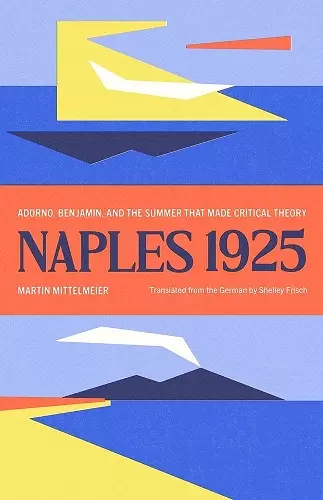Naples 1925
Adorno, Benjamin, and the Summer That Made Critical Theory
Martin Mittelmeier author Shelley Frisch translator
Format:Hardback
Publisher:Yale University Press
Published:28th Jan '25
Should be back in stock very soon

The untold story of how the volcanic landscape surrounding Naples influenced a crucial moment in twentieth-century intellectual history
A New Yorker “Best Book of 2024” Selection
“Well-written—and well-translated.”—Dominic Green, Wall Street Journal
In the 1920s, the Gulf of Naples was a magnet for European intellectuals in search of places as yet untouched by modernity. Among the revolutionaries, artists, and thinkers drawn to Naples were numerous scholars at a formative stage in their journeys: Walter Benjamin, Siegfried Kracauer, Alfred Sohn‑Rethel, Asja Lacis, Theodor W. Adorno, and many others. While all were indelibly shaped by the volcanic Neapolitan landscape, it was Benjamin who first probed the relationship between the porous landscape and the local culture. But Adorno went further, transforming his surroundings into a radical new philosophy—one that became a turning point in the modern history of the discipline.
In this ingenious book, Martin Mittelmeier reveals the Gulf of Naples as the true birthplace of the Frankfurt School. From the majestic crater rim of Mount Vesuvius to the soft volcanic rock that Neapolitans used to build their city, Mittelmeier follows Adorno’s and his fellow thinkers’ footsteps through the cities along the gulf, demonstrating how their observations and encounters surface again and again in their writings for decades to come, and serve as the structuring principle of Critical Theory.
A New Yorker “Best Book of 2024” Selection
“Well-written—and well-translated.”—Dominic Green, Wall Street Journal
“Naples 1925 is a kind of intellectual history by way of Vitamin D synthesis. [Mittelmeier] examines how this group of thinkers was changed by the Italian environment. . . . That their time in the south marked them is undeniable.”—Thomas Meaney, New Yorker
“What a trip! Mittelmeier is the perfect philosophical travel guide, and Naples 1925 is as original as it is accessible.”—Wolfram Eilenberger, author of Time of the Magicians: Wittgenstein, Benjamin, Cassirer, Heidegger, and the Decade That Reinvented Philosophy
“A rare treat. In sprightly, dancing prose, Mittelmeier constructs a convincing allegory of porosity as the cardinal feature of the volcanic rock of Naples and the structural principle of essays by the initiators of modern Critical Theory.”—Stanley Corngold, author of Expeditions to Kafka
“Like Goethe before them, Adorno and his Frankfurt School colleagues were turned on by trips to Italy. Martin Mittelmeier poetically and convincingly shows that early exposure to Vesuvius’s chthonic forces, the dynamiting of Positano’s cliffs, erotic idylls on Capri, and seething Neapolitan street life shook these German Jewish Marxists from their dogmatic slumbers and inspired their still-deranging writings.”—Stuart Jeffries, author of Grand Hotel Abyss: The Lives of the Frankfurt School
“Equal parts travelogue and philosophical meditation, Mittelmeier’s fascinating book reflects some of the same porosity that Walter Benjamin attributed to the Italian city. In pellucid translation, Naples 1925 is sure to dazzle its Anglo-American audience.”—Noah Isenberg, University of Texas at Austin
“Naples 1925 is a delightful book: a great read about a little-known adventure that brought together Adorno, Benjamin, and Kracauer in Naples and Capri.”—Seyla Benhabib, Yale University
“An audacious new reading of the origins of Critical Theory in the interactions of Adorno, Benjamin, Lacis, Sohn-Rethel and Kracauer during their stays in evocative locations around the Bay of Naples in the mid-1920s. Persons, places, and ideas come together in fresh and suggestive constellations in this remarkable book.”—Martin Jay, author of Magical Nominalism: The Historical Event, Aesthetic Re-enchantment, and the Photograph
Praise for the German Edition:
“An invitation to completely rediscover the famous Adorno. . . . His philosophy, which seems so hermetic, severe, and heavy, is restored to its origins . . . the loose tuff, the rushing of the water on the siren rocks, but also the gloomy, prehistoric Positano and the eerie water monsters of the famous Naples Aquarium. . . . An original and personal book.”—Frankfurter Allgemeine Zeitung
“Inventive and original, working with impressive ingenuity to relate the major categories of Adorno’s thought—and, pars pro toto, those of the Frankfurt School more broadly—to the rugged landscape of the Neapolitan coast. . . . A fresh perspective on a familiar body of work.”—Times Literary Supplement
“Extremely impressive and very inspiring.”—Deutschlandradio Kultur
“A stimulating cultural and intellectual history of the Gulf of Naples.”—Darmstädter Zeitung
“An atmospherically rich study.”—Der Freitag
ISBN: 9780300259308
Dimensions: unknown
Weight: unknown
200 pages